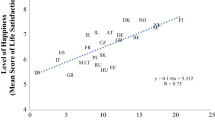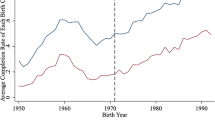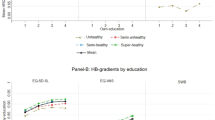Abstract
Antecedents of wellbeing across different socio-cultural contexts is a question that psychologists and other social scientist continue to grapple with. Although evidence supporting higher educational levels as being beneficial for wellbeing is significant, there are still contradictory findings, necessitating further exploration into this relationship. Moreover, current evidence seems to focus mostly on data derived from Western samples and have adopted limited measures of wellbeing. The present study explores the relationship between schooling and a subset of 31 wellbeing-related categories in the Gallup World Poll conducted over three years (2020–2022), encompassing 386,654 individuals in 142 countries. The findings indicate that overall participants with higher levels of education fare better than those with lower levels of education. However, disaggregation and comparison across key social indicators, specifically, country/region of residence, sex and age showed that there were instances where higher levels of education were less beneficial for wellbeing. While acknowledging the importance of education for wellbeing, our findings suggest the need to consider how unique socio-cultural factors might further complicate the benefits of education. We also suggest that governments might need to consider what policies are necessary to make the benefits of education more apparent and ubiquitous.
Similar content being viewed by others
Data Availability
The data that support the findings of this study are available from the Gallup World Poll, but restrictions apply to the availability of these data. The data are, however, available from the authors upon reasonable request and with the permission of Gallup World Poll.
References
Alesina, A., Di Tella, R., & MacCulloch, R. (2004). Inequality and happiness: Are Europeans and Americans different? Journal of Public Economics,88(9–10), 2009–2042. https://doi.org/10.1016/j.jpubeco.2003.07.006
Araki, S. (2022). Does education make people happy? Spotlighting the overlooked societal condition. Journal of Happiness Studies,23, 587–629. https://doi.org/10.1007/s10902-021-00416-y
Becker, G. (1964). Human capital: A theoretical and empirical analysis, with special reference to education. Columbia University Press.
Bergman, M. (2018). More money, more crime: Prosperity and rising crime in Latin America. Oxford University Press.
Blanchflower, D. G., & Oswald, A. J. (2008). Is wellbeing U-shaped over the life cycle? Social Science & Medicine,66(8), 1733–1749. https://doi.org/10.1016/j.socscimed.2008.01.030
Brighouse, H. (2006). On education. Routledge.
Chen, W.-C. (2012). How education enhances happiness: Comparison of mediating factors in four East Asian countries. Social Indicators Research,106, 117–131. https://doi.org/10.1007/s11205-011-9798-5
Clark, A. E., & Oswald, A. J. (1994). Unhappiness and unemployment. The Economic Journal,104(424), 648–659. https://doi.org/10.2307/2234639
Clark, A. E., & Oswald, A. J. (1996). Satisfaction and comparison income. Journal of Public Economics,61(3), 359–381. https://doi.org/10.1016/0047-2727(95)01564-7
Cuñado, J., & de Gracia, F. P. (2012). Does education affect happiness? Evidence for Spain. Social Indicators Research,108, 185–196. https://doi.org/10.1007/s11205-011-9874-x
Di Tella, R., MacCulloch, R. J., & Oswald, A. J. (2001). Preferences over inflation and unemployment: Evidence from surveys of happiness. The American Economic Review,91(1), 335–341. https://doi.org/10.1257/aer.91.1.335
Dockery, A. M. (2003). Happiness, life satisfaction and the role of work: Evidence from two Australian surveys. Curtin University of Technology, Western Australia.
Hartog, J., & Oosterbeek, H. (1998). Health, wealth and happiness: Why pursue a higher education? Economics of Education Review,17(3), 245–256. https://doi.org/10.1016/S0272-7757(97)00064-2
Headey, B., & Wooden, M. (2004). The effects of wealth and income on subjective wellbeing and ill-being. Economic Record,80(Suppl. 1), S24–S33. https://doi.org/10.1111/j.1475-4932.2004.00181.x
Helliwell, J. F. (2003). How’s life? Combining individual and national variables to explain subjective wellbeing. Economic Modelling,20(2), 331–360. https://doi.org/10.1016/S0264-9993(02)00057-3
Helliwell, J. F. (2006). Well-being, social capital and public policy: What’s new? The Economic Journal,116(510), C34–C45. https://doi.org/10.1111/j.1468-0297.2006.01074.x
Helliwell, J., Layard, R., & Sachs, J. (Eds.). (2012). World happiness report. Sustainable Development Solutions Network. https://worldhappiness.report/ed/2012/. Accessed 23 November 2023.
Helliwell, J. F., Layard, R., Sachs, J., & Jan-Emmanuel De Neve, J.-E. (Eds.). (2020). World happiness report 2020. Sustainable Development Solutions Network. https://worldhappiness.report/ed/2020/. Accessed 21 November 2023.
Hickson, H., & Dockery, A. M. (2008). Is ignorance bliss: Exploring the links between education, expectations and happiness [Paper Presentation]. 37th Australian Conference of Economists. http://hdl.handle.net/20.500.11937/11362. Accessed 30 November 2023
Hobfoll, S. E. (2011). Conservation of resources theory: Its implication for stress, health, and resilience. The Oxford Handbook of Stress, Health, and Co**,127, 147.
Huta, V. (2016). Eudaimonic and hedonic orientations: Theoretical considerations and research findings. Handbook of eudaimonic well-being, 215–231.
Huong, N. T., Ha, L. T. H., & Tien, T. Q. (2017). Determinants of health-related quality of life among elderly: evidence from Chi Linh Town, Vietnam. Asia Pacific Journal of Public Health, 29(5, Suppl), S84–S93. https://doi.org/10.1177/1010539517704041
Huppert, F. A. (2009). Psychological wellbeing: Evidence regarding its causes and consequences. Applied Psychology: Health and Wellbeing,1(2), 137–164. https://doi.org/10.1111/j.1758-0854.2009.01008.x
Ilies, R., Yao, J., Curseu, P. L., & Liang, A. X. (2019). Educated and happy: A four-year study explaining the links between education, job fit, and life satisfaction. Applied Psychology: An International Review,68(1), 150–176. https://doi.org/10.1111/apps.12158
Inglehart, R., & Klingemann, H.-D. (2000). Genes, culture, democracy, and happiness. In E. Diener & E. M. Suh (Eds.), Culture and subjective well-being. MIT Press. https://doi.org/10.7551/mitpress/2242.001.0001
ISTAT (Italian National Statistical Institute). (2015). L’inserimento professionale dei dottori di ricerca Anno 2014, Statistiche Report. Retrieved 20, June 2024, from http://www.istat.it/it/files/2015/01/Dottori-di-ricerca_DEF.pdf?title=Inserimento+professionale+dei+dottori+di+ricerca+-+21%2Fgen%2F2015+-+Testo+integrale.pdf
Jongbloed, J. (2018). Higher education for happiness? Investigating the impact of education on the hedonic and eudaimonic wellbeing of Europeans. European Educational Research Journal,17(5), 733–754.
Joshanloo, M. (2018). Longitudinal associations between subjective and psychological well-being in Japan: A four-year cross-lagged panel study. Personality and Individual Differences, 134, 289–292.
Lim, H.-E., Shaw, D., Liao, P. S., & Duan, H. (2020). The effects of income on happiness in East and South Asia: Societal values matter? Journal of Happiness Studies, 21(2), 391–415.
Lomas, T. (2023). Exploring associations between income and wellbeing: New global insights from the Gallup World Poll. The Journal of Positive Psychology. Advance online publication. https://doi.org/10.1080/17439760.2023.2248963
Lomas, T., Waters, L., Williams, P., Oades, L. G., & Kern, M. L. (2021). Third wave positive psychology: Broadening towards complexity. The Journal of Positive Psychology, 16(5), 660–674.
Lomas, T., & VanderWeele, T. J. (2022). The garden and the orchestra: Generative metaphors for conceptualizing the complexities of well-being. International Journal of Environmental Research and Public Health,19(21), 14544. https://doi.org/10.3390/ijerph192114544
Manfra, P. (2002). Entrepreneurship, firm size and the structure of the Italian economy. Journal of Entrepreneurial Finance and Business Ventures,7(3), 99–111. https://doi.org/10.57229/2373-1761.1100
Michalos, A. C. (2017). Connecting the quality of life theory to health, wellbeing and education: The selected works of Alex C. Springer. https://doi.org/10.1007/978-3-319-51161-0
Ngoo, Y. T., Tey, N. P., & Tan, E. C. (2015). Determinants of life satisfaction in Asia. Social Indicators Research,124(1), 141–156. https://doi.org/10.1007/s11205-014-0772-x
Niemeyer, H., Bieda, A., Michalak, J., Schneider, S., & Margraf, J. (2019). Education and mental health: Do psychosocial resources matter? SSM- Population Health,7, e100392. https://doi.org/10.1016/j.ssmph.2019.100392
Nikolaev, B. (2018). Does higher education increase hedonic and eudaimonic happiness? Journal of Happiness Studies,19, 483–504. https://doi.org/10.1007/s10902-016-9833-y
Nikolaev, B., & Rusakov, P. (2016). Education and happiness: An alternative hypothesis. Applied Economics Letters,23(12), 827–830. https://doi.org/10.1080/13504851.2015.1111982
Patria, B. (2022). Modeling the effects of physical activity, education, health, and subjective wealth on happiness based on Indonesian national survey data. BMC Public Health,22(1), 959.
Powdthavee, N., Lekfuangfu, W. N., & Wooden, M. (2015). What’s the good of education on our overall quality of life? A simultaneous equation model of education and life satisfaction for Australia. Journal of Behavioral and Experimental Economics,54, 10–21. https://doi.org/10.1016/j.socec.2014.11.002
Rodríguez-Pose, A., & von Berlepsch, V. (2014). Social capital and individual happiness in Europe. Journal of Happiness Studies,15, 357–386. https://doi.org/10.1007/s10902-013-9426-y
Ruiu, G., & Ruiu, M. L. (2019). The complex relationship between education and happiness: The case of highly educated individuals in Italy. Journal of Happiness Studies,20, 2631–2653. https://doi.org/10.1007/s10902-018-0062-4
Salinas-Jiménez, M. M., Artés, J., & Salinas-Jiménez, J. (2011). Education as a positional good: A life satisfaction approach. Social Indicators Research,103, 409–426. https://doi.org/10.1007/s11205-010-9709-1
Schaafsma, J. (1976). The consumption and investment aspects of the demand for education. The Journal of Human Resources,11(2), 233–242. https://doi.org/10.2307/145456
Schultz, T. W. (1960). Capital formation by education. Journal of Political Economy,68(6), 571–583.
VanderWeele, T. J. (2017). On the promotion of human flourishing. Proceedings of the National Academy of Sciences,114(31), 8148–8156. https://doi.org/10.1073/pnas.1702996114
Veenhoven, R. (2010). Greater Happiness for a Greater Number. Journal of Happiness Studies, 11, 605–629. https://doi.org/10.1007/s10902-010-9204-z
Veenhoven, R. (1996). Happy life-expectancy: A comprehensive measure of quality-of-life in nations. Social Indicators Research,39, 1–58. https://doi.org/10.1007/BF00300831
Wilson Fadiji, A., Meiring, L., & Wissing, M. P. (2021). Understanding well-being in the Ghanaian context: Linkages between lay conceptions of well-being and measures of hedonic and eudaimonic well-being. Applied research in quality of life, 16(2), 649–677.
Wissing, M. P. (2022). Beyond the “third wave of positive psychology”: Challenges and opportunities for future research. Frontiers in Psychology, 12, 795067.
Author information
Authors and Affiliations
Corresponding author
Ethics declarations
Ethics Approval
Approval for the study was granted by the Human Flourishing Program, Harvard University.
Research Involving Human Participants
Data collection was undertaken in accordance with the standard and established protocol of the GWP.
Informed Consent
All participants were duly informed of the aims of the study and voluntarily participated in the study. Data collection was undertaken in accordance with the standard and established protocol of the GWP.
Disclosure of Potential Conflicts of Interest
The authors have no competing interests to declare that are relevant to the content of this article.
Additional information
Publisher's Note
Springer Nature remains neutral with regard to jurisdictional claims in published maps and institutional affiliations.
Supplementary Information
Below is the link to the electronic supplementary material.
Rights and permissions
Springer Nature or its licensor (e.g. a society or other partner) holds exclusive rights to this article under a publishing agreement with the author(s) or other rightsholder(s); author self-archiving of the accepted manuscript version of this article is solely governed by the terms of such publishing agreement and applicable law.
About this article
Cite this article
Wilson Fadiji, A., Lomas, T. Understanding the Association Between Education and Wellbeing: An Exploration of the Gallup World Poll. Applied Research Quality Life (2024). https://doi.org/10.1007/s11482-024-10335-8
Received:
Accepted:
Published:
DOI: https://doi.org/10.1007/s11482-024-10335-8




